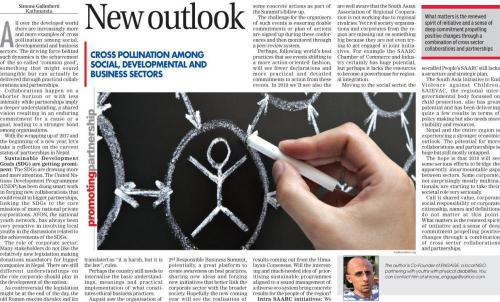
All over the developed world there are increasingly more and more examples of cross pollination among social, developmental and business sectors.
The driving force behind such dynamics is the achievement of the so called “common good”, something that might sounds intangible but can actually be delivered through practical collaborations and partnerships.
Collaborations happen on a shorter horizon or with less intensity while the latter, partnerships imply a deeper understanding, a shared vision resulting in an enduring commitment for a cause or a goal, leading to a stronger bond among organizations.
With the wrapping up of 2017 and the beginning of a new year, let’s take a reflection on the current status of partnerships in Nepal.
SDGs are getting prominent: The Sustainable Development Goals are drawing more and more attention. The United Development Program, UNDP, has been doing a smart work in forging new collaborations that could result in bigger partnerships, linking the SDGs to the core missions of many national private corporations.
AYON, the national youth network, has always been very proactive, always thanks to UNDP, to involve local youths in the discussions related to the achievements of the SDGs.
Obviously such initiatives must lead to concrete deliverables with a clear and measurable impact, going beyond the SDGs focused awareness making that though important, is just a means to a higher end.
The role of Corporate Sector: Many stakeholders do not like the relatively new legislation making donations mandatory for bigger companies in Nepal. There are still different understandings on the role corporates should play in the development of the nation.
As controversial the legislation might be at the end of the day, the old roman maxim “dura lex sad lex” translated as "it is harsh, but it is the law", rules.
Perhaps the country still needs to internalize the basic understandings, meanings and practical implementation of what constitutes ethical business practices.
August saw the organization of 2nd Responsible Business Summit, potentially, a great platform to create awareness on best practices, sharing new ideas and forging new initiatives that better link the corporate sector with the broader society.
Hopefully the new coming year will see the realization of some concrete actions as part of the Summit’s follow up.
The challenge for the organizers of such events is ensure that doable commitments or plan of actions are signed up during these conferences and then monitored through a peer review system.
Perhaps, following world best practices that see events shifting to a more action oriented fashion, also in Nepal we will see fewer declarations and more practical and detailed commitments to action from these events.
In 2018 we’ll see also the results coming out from the so called Himalayan Consensus. Will the interesting and much needed idea of prioritizing sustainable programs aligned to a sound management of a diverse eco-system bring concrete results for the people of the region?
Intra SAARC initiatives: We are well aware that the South Asian Association of Regional Cooperation is not working due to regional rivalries.
Yet civil society organizations and corporates from the region are missing here something big because they are not even trying to get engaged in joint initiatives.
For example the SAARC Chamber of Commerce and Industry has certainly a huge potential, perhaps it lacks the resources to become a powerhouse for regional integration.
Moving to the social sector, the so called People’s SAARC still lacks a structure and strategic plan.
The South Asia Initiative to End Violence against Children, SAIEVAC, the regional inter-governmental body focused on child protection, has certainly a great potential and has been delivering quite few results in terms of policy making but also needs more visibility and resources.
Conclusion
Nepal and the entire region is experiencing a stronger economic outlook. The potential for more collaborations and partnerships are huge but is still mostly untapped.
The hope is that 2018 will see some serious efforts to bridge the apparently insurmountable gaps between sectors. Some corporates, not surprisingly mostly multinationals, are starting to take their societal role very seriously.
Call it shared value, corporate social responsibility or corporate citizenship. Names and definitions do not matter at this point.
What matters are a renewed spirit of initiative and a sense of deep commitment propelling positive changes through a combination of cross sector collaborations and partnerships.










Add new comment